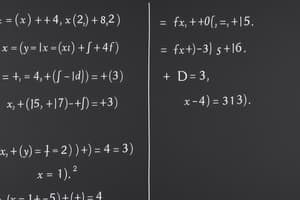Podcast
Questions and Answers
What is the term used to describe a function with a degree of 1?
What is the term used to describe a function with a degree of 1?
- Polynomial function
- Linear function (correct)
- Rational function
- Quadratic function
What is the domain of a quadratic function?
What is the domain of a quadratic function?
- Set of integers
- Set of all positive numbers
- Set of all real numbers (correct)
- Set of nonnegative numbers
The range of a linear function is the set of all real numbers.
The range of a linear function is the set of all real numbers.
True (A)
What is the definition of the domain of a function?
What is the definition of the domain of a function?
What does the range of a function represent?
What does the range of a function represent?
What is a rational function?
What is a rational function?
What is the domain of a rational function?
What is the domain of a rational function?
The domain of a radical function includes values that make the radicand negative.
The domain of a radical function includes values that make the radicand negative.
What is the degree of a quadratic function?
What is the degree of a quadratic function?
What is the domain of a polynomial function?
What is the domain of a polynomial function?
A function that has a degree of 2 and whose graph is a _____ is called a quadratic function.
A function that has a degree of 2 and whose graph is a _____ is called a quadratic function.
Flashcards are hidden until you start studying
Study Notes
Objectives
- Identify functions as linear, quadratic, polynomial, rational, or radical.
- Find the domain and range of various types of functions.
- Determine the domain and range of functions represented graphically.
Domain of a Function
- Represents all values of the independent variable that yield valid corresponding values for the dependent variable.
- Example: For a function, the domain consists of all first coordinates.
Range of a Function
- Involves all values achievable from possible values of the function.
- Example: For a function, the range comprises all second coordinates.
Types of Functions
Linear Function
- Defined by a degree of 1, resulting in a straight line on a graph.
- Both domain and range include all real numbers.
Quadratic Function
- Characterized by a degree of 2, producing a parabolic graph.
- Domain includes all real numbers.
Polynomial Function
- Involves nonnegative integer powers of the independent variable.
- Domain consists of all real numbers; the range depends on the degree (odd degree results in all real numbers).
Rational Function
- Expressed as a ratio of two polynomials.
- Domain comprises all real numbers except where the denominator equals zero.
Radical Function
- Contains radical expressions.
- Domain includes all real numbers except those making the radicand of even-indexed radicals negative.
Examples
- A linear function has both domain and range as real numbers.
- For square root functions, the radicand must be nonnegative for the function to be defined, affecting the domain and range.
Practice Problems
- Find the domain and range for given functions.
- Analyze the domain and range based on function graphs.
Key Points Summary
- Domain: Set of values for the independent variable with corresponding dependent variable outcomes.
- Range: Set of values obtainable from the possible function values.
- Understanding function types aids in determining their domain and range effectively.
Studying That Suits You
Use AI to generate personalized quizzes and flashcards to suit your learning preferences.




